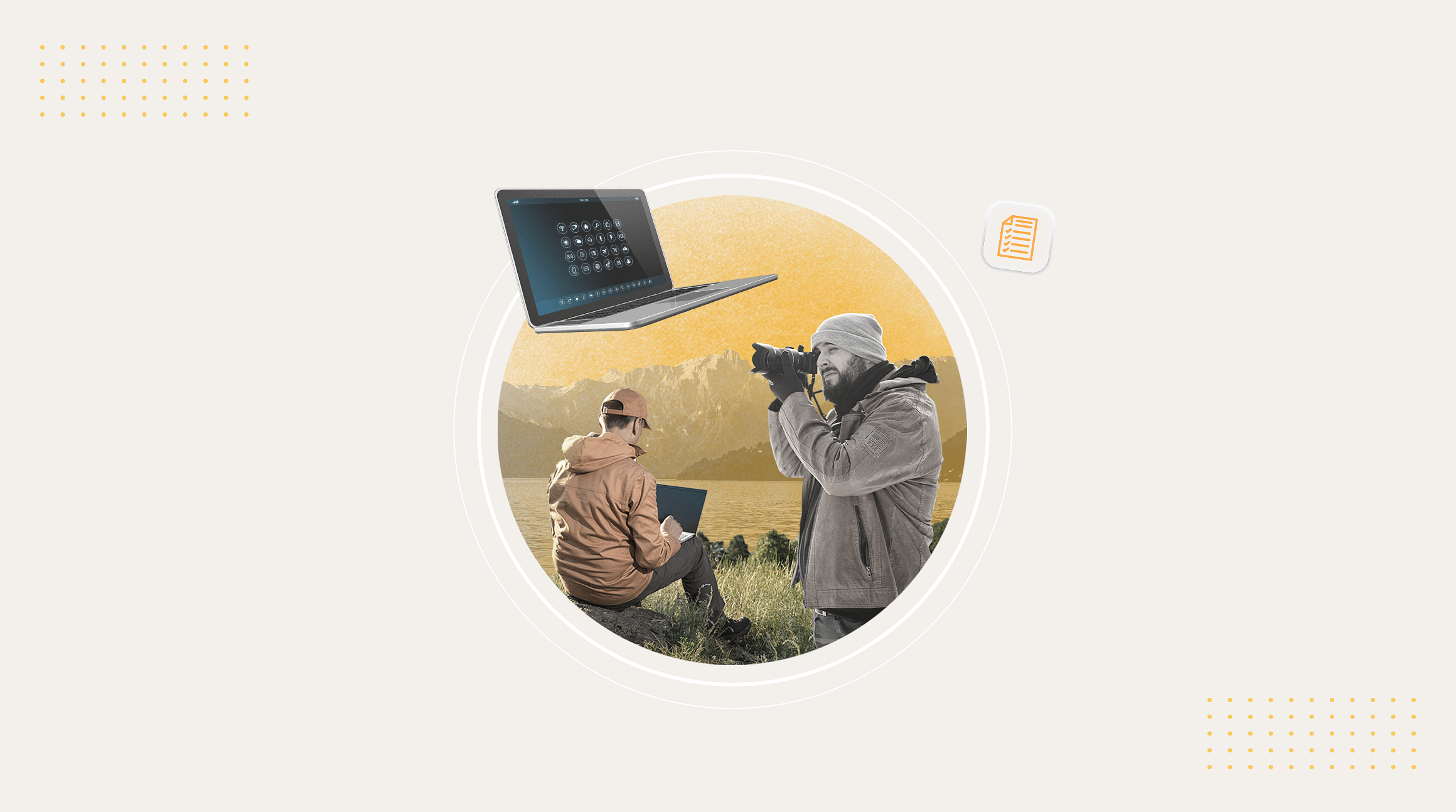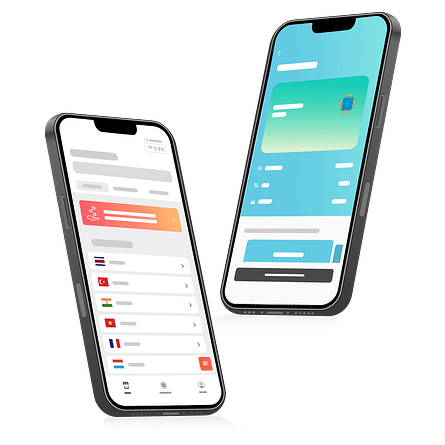
Jump to a section of this guide:
👉 Assess and Develop Your Skills
👉 Keep Your Finger on the Pulse of Remote Work Opportunities
👉 Build a Reliable Income Stream
👉 Leverage the Digital Nomad Community
While the rest of the UK was panic-buying toilet paper during lockdown, a quiet revolution was brewing.
Remote work went from being a niche arrangement to a necessary one. And now, digital nomads are redefining what it means to go to work.
With businesses feeling the benefits of hybrid and remote workforces, 9-to 5-office life is no longer the norm.
Now all many of us need to be productive is some decent tech and a reliable internet connection.
How to Become a Digital Nomad - A Guide for Brits
Amid this shift, the possibility of becoming a digital nomad is certainly a draw for many Brits.
But, of course, it's not a rash decision to make. It's also not all about the glamour of travel.
It's about redesigning your life in the long-term to put freedom first. It could be considered as having your cake and eating it too.
Only the cake is a career you can get up and take along with you.
But before you write that resignation letter and book a one-way ticket to Bali, take a look through this guide on how to become a digital nomad.
Assess and Develop Your Skills
One of the first things to consider is your current skillset.
Have an audit of your qualifications, experience and talents. Which could you use remotely? Writing, graphic design, programming and digital marketing are among the most versatile skills for digital nomads.
If your skills don't immediately lend themselves to remote work, not to worry.

Adobe Free Stock / Prostock-studio
The internet is full of affordable, and sometimes free, courses. Platforms such as Udemy and Skillshare offer a wide range. They can also help you discover whether an occupation is for you before you fully commit.
Here are a few directions you may want to explore.
- Content writing - Learn SEO, blogging and copywriting.
- Digital marketing - A broad field, it's advisable to specialise in a niche, i.e., social media management, email strategy or PPC.
- Web development - Start with HTML and CSS before tackling languages such as JavaScript and frameworks like React JS.
- Graphic design - Studying the principles of design, training up in the Adobe suite and building a portfolio could open doors.
You won't become an expert overnight. Many successful remote workers start with basic skills and develop them over time, leading to increasing commissions and working partnerships.
The key to changing careers and succeeding lies in determination, consistency and hard work over the long term.
Have A Portfolio to Hand
Although not all careers will require a portfolio, there are many that do.
If you're steadily building a career in a field such as copywriting, illustrating, photography, web development or translation to name a few, a portfolio could help you get a foot in the door.

Adobe Free Stock / fizkes
There are many options out there for creating a portfolio with low or no budget and little or no experience.
Some sites you can use to do this include GitHub, Behance, Wix and Framer.
Alternatively, you can go through the Adobe suite to design your portfolio and save it as a PDF you can email.
Either way, the process of finding, bidding for and winning work can be drastically sped up with a current portfolio.
Keep Your Finger on the Pulse of Remote Work Opportunities
A great way to assess whether the digital nomad lifestyle is sustainable for you is to familiarise yourself with the quantity, quality and locations of live openings.
Subscribe to Remote Job Boards
Some of the best UK-friendly remote job sites include
- Escape the City - Remote jobs focused on purpose-driven work.
- Work in Startups - Great for UK-based remote roles in tech and digital industries.
- EU Remote Jobs - A job board dedicated to listing remote positions in European time zones.
- Welcome to the Jungle (formerly Otta) - AI-driven job board that tailors remote job matches to your experience.
- We Work Remotely, Remote.co, Remotive and FlexJobs - Global platforms with strong UK job listings.
Set up email alerts to get tailored job listings sent straight to your inbox.
Follow Remote-Friendly Companies
There are plenty of UK-based and international companies known for hiring remote workers, including the following.
- Chili Piper
- Automattic
- GitLab
- Hopin
- Namecheap
- Zapier
Explore Freelance and Contract Work
If full-time remote roles are hard to come by, consider freelancing via:
- PeoplePerHour - UK-based freelance marketplace.
- YunoJuno - Freelance roles in design, tech and marketing.
- Upwork, Fiverr, Toptal, Contra - International platforms with UK-based clients.
Build a Reliable Income Stream
Before going all-in on digital nomad life, it's important to develop a regular and stable income stream.
Sure, this may take months or even years, but the long-term benefits are there for the taking.

Adobe Free Stock / Seventyfour
Ways to build an income include through long-term roles that enable you to work from anywhere, freelancing, or a mixture of both.
Ideally, you should aim to achieve:
- A reliable income source, preferably several. Clients are a revolving door when you freelance. So you need to be prepared to lose and gain them at all times.
- At least 3-6 months of living expenses saved up as a buffer. If you're working for yourself, you need to provision for illness, bereavement and annual leave.
- A growing client base or a secure remote job. Making a success of the digital nomad lifestyle is all about minimising risk.
Start building your freelance work or new skillset on the side while still in your current job.
This bridge period gives you the security to trial the lifestyle while still getting a regular paycheck.

Adobe Free Stock / Nattakorn
Job boards such as Upwork, Fiverr and LinkedIn can help you find clients. And don't forget your existing networks.
That old colleague who started a business? They could be your first client. Reach out and ask how they are - you never know when you might uncover an opportunity.
Plan Your Transition
The transition to a digital nomad lifestyle requires a lot of logistical planning. The following are essential starting points to consider.
- Visas and Legalities - Research the visa requirements for the countries you'd like to travel to. Some nations offer specific digital nomad visas. Portugal, Croatia and Estonia have these in place to welcome digital nomads, recognising their contribution to the economy and workforce.
- Healthcare - Check the healthcare coverage options available to you in your chosen location. Some insurance companies offer healthcare packages specifically for digital nomads that cover hospital care, treatment and emergencies.
- Budgeting - Plan for travel expenses, accommodation, insurance and other costs. Nomad life doesn't have to break the bank, but it will require careful thought. Although many cities cost less than the UK, unexpected expenses add up quickly.
Leverage the Digital Nomad Community

Adobe Free Stock / DisobeyArt
Connecting with fellow digital nomads can provide support and valuable insights.
Engage in online forums, attend networking events and consider co-living or co-working spaces to build relationships and share experiences. Join:
- r/digitalnomad (Reddit) - Insider job leads, tax advice and first-hand experiences.
- Nomad List - Includes rankings of the best cities for remote work.
- Facebook Groups - Digital Nomad Jobs, Remote Workers UK, London Digital Nomads.
The people you meet will become your support system. And more often than not, they'll share advice on everything from the best digital nomad eSIMs to which countries have the most reliable WiFi.
Adopt a Resilient Mindset
The digital nomad life can be unpredictable, sometimes isolating and full of curveballs. That's why emotional resilience isn't just helpful - it's essential.

Adobe Free Stock / Svitlana
Always Have a Plan B
You’ll need to bounce back fast from accommodation issues, last-minute visa changes or the occasional bout of homesickness.
The key? Adaptability, problem-solving and keeping a sense of humour when things go sideways.
Stay Organised and Focused
Time zones, visa renewals, client deadlines - it's a lot to juggle. Without a solid system, things can slip through the cracks fast.
Make use of digital tools like Notion, Trello or Google Calendar to keep your work, travel plans and finances in check.
Regular check-ins with yourself, and your spreadsheets, will help you stay on top of the chaos.
Set and Maintain Boundaries

Adobe Free Stock / Pixel-Shot
When your office is wherever you open your laptop, work-life balance can blur quickly.
Setting clear boundaries is crucial - both for your wellbeing and your productivity. Define your work hours, create a routine and carve out proper breaks, lunches and downtime.
It's tempting to say yes to every opportunity, but learning when to log off will help you sustain this lifestyle in the long run.
Ready to Make the World Your Office?
Planning to start your new life as a digital nomad? Then one of the first things you'll need is to stay connected on the move.
A Europe eSIM from Airalo is perfect for UK digital nomads exploring the continent.
No more hunting for local SIMs or getting stung by roaming charges. Just connect, arrive and thrive.



